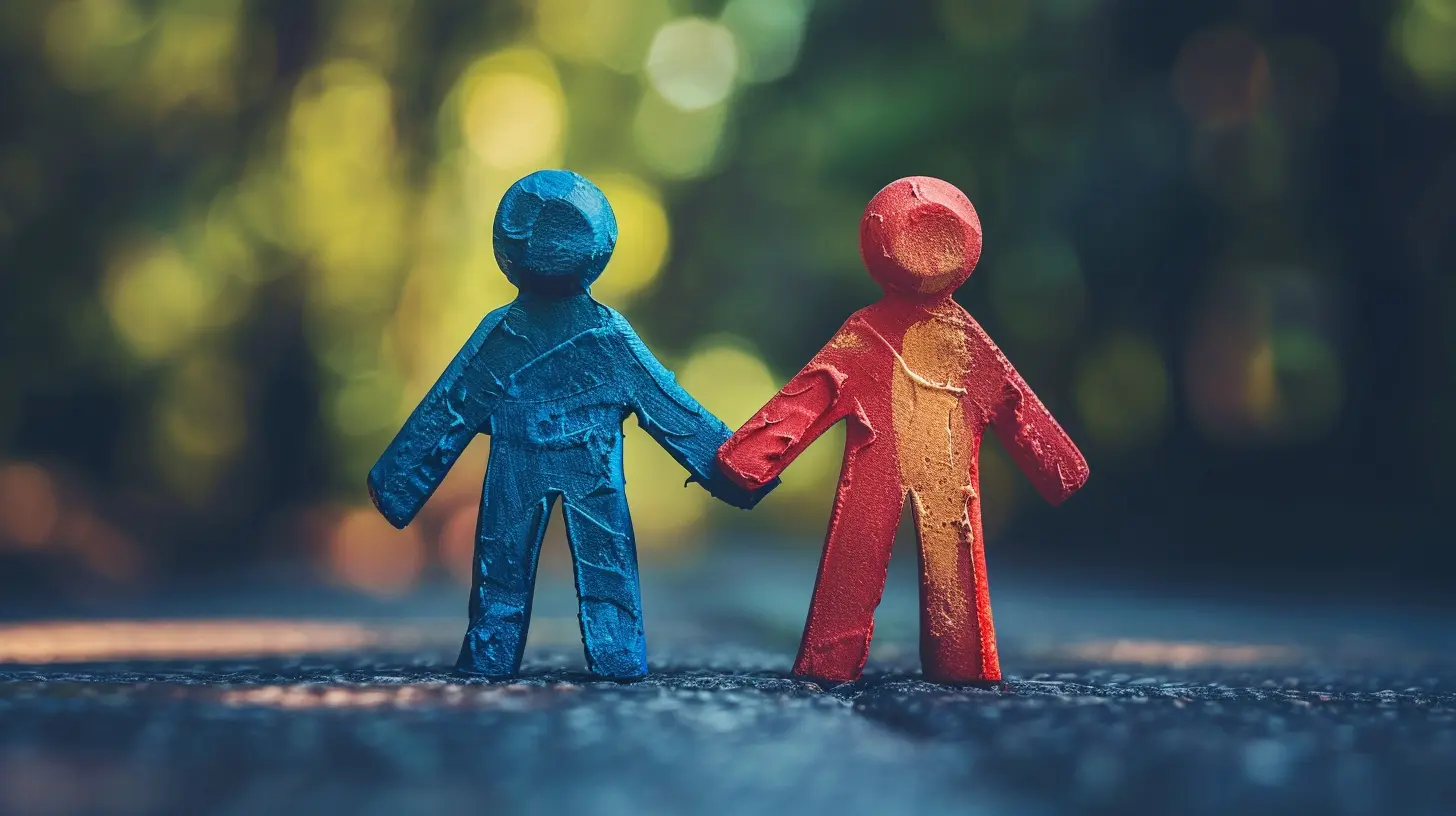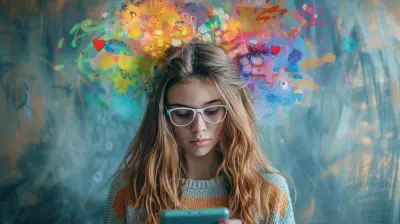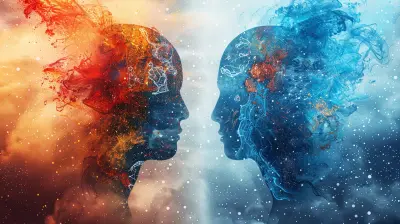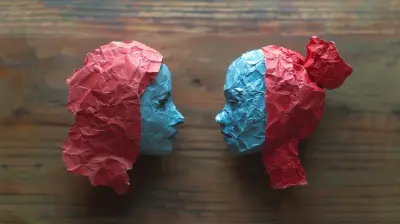The Role of Empathy in Building Stronger Relationships
19 February 2025
Relationships, whether personal or professional, are like plants—they require care, attention, and most importantly, empathy to thrive. Empathy is often the secret sauce that transforms a surface-level connection into a deep, meaningful bond. But what exactly is it about empathy that makes it so powerful? How does it help us build stronger, more resilient relationships? If you’ve ever wondered about any of these questions, you’re in the right place.
In this article, we'll dive into the role empathy plays in relationships, why it's essential, and how you can cultivate it to enhance the quality of your connections. So, grab a cup of coffee, get comfy, and let’s explore this vital component of human interaction.

What Is Empathy, Really?
Before we get into the nitty-gritty of how empathy can improve relationships, let’s first define what empathy is. In simple terms, empathy is the ability to understand and share the feelings of another person. It’s like putting yourself in someone else's shoes—not just intellectually, but emotionally as well.There are two main types of empathy:
1. Cognitive Empathy: This is the ability to understand someone else’s perspective or mental state. You recognize what the other person is feeling, but you don’t necessarily feel it yourself.
2. Emotional Empathy: This goes a step further. Not only do you understand what the other person is going through, but you also feel their emotions as if they were your own. It’s like catching someone else’s emotional "vibe."
Both types of empathy are essential in building strong relationships. Cognitive empathy allows you to intellectually connect with someone, while emotional empathy creates a deeper emotional bond.
But why is empathy so important in relationships? Let’s break it down.

The Importance of Empathy in Relationships
1. It Fosters Trust and Emotional Safety
Have you ever had a conversation with someone who truly "got you"? A person who didn’t just hear your words but understood the emotions behind them? That’s the magic of empathy in action. When someone feels understood, they are more likely to open up and trust you.Trust is the cornerstone of any strong relationship. Without it, there’s a constant sense of tension and uncertainty. Empathy fosters trust because it shows the other person that you’re not just interested in their words but also in their emotional well-being. This creates a safe emotional space where both parties can be vulnerable without fear of judgment.
2. It Reduces Conflict
Conflict is inevitable in any relationship. But how you handle it makes all the difference. Empathy plays a crucial role in reducing misunderstandings and resolving conflicts quickly. When you’re able to see things from the other person’s perspective, you’re less likely to escalate the situation. Empathy helps you pause and think, “Why are they feeling this way?” instead of jumping to conclusions or reacting defensively.Imagine a heated argument with your partner. Instead of focusing on winning the argument, empathy allows you to understand why they’re upset. Maybe they had a rough day at work, or perhaps they’re stressed about something else entirely. Once you recognize where they’re coming from, it becomes easier to address the root cause rather than the surface-level disagreement.
3. It Strengthens Emotional Bonds
Think of empathy as the glue that holds relationships together. When you practice empathy, you’re showing the other person that you care about their feelings and experiences. This emotional connection leads to a stronger bond, which in turn creates a more resilient relationship.Empathy helps you stay attuned to the emotional needs of others, allowing you to offer support when it’s needed most. Over time, this builds deeper emotional intimacy, which is essential for long-lasting relationships—whether it's with a friend, family member, or romantic partner.
4. It Enhances Effective Communication
Communication is the foundation of any relationship. But let’s be real—communication without empathy is like trying to talk to a brick wall. You might be speaking, but the other person isn’t truly listening or understanding.Empathy makes conversations more meaningful. It allows you to pick up on the non-verbal cues, tone of voice, and subtle emotions that words alone might not convey. It also encourages active listening, where you’re not just waiting for your turn to speak but are genuinely engaged in what the other person is saying.
When you practice empathetic communication, you’re more likely to respond in ways that meet the emotional needs of the other person. And guess what? That’s when real, productive conversations happen.

How to Cultivate Empathy in Your Relationships
Now that we’ve covered why empathy is essential, you might be wondering how you can cultivate more of it in your own relationships. Don’t worry; empathy isn’t some mystical trait that only a few people possess. It’s a skill that anyone can develop with a little practice.Here are some simple but effective strategies to become more empathetic:
1. Practice Active Listening
When was the last time you truly listened to someone without thinking about your response? Active listening is about being fully present in the conversation. It means focusing on the speaker, not interrupting, and truly absorbing what they’re saying.Next time you’re in a conversation, try this: Instead of planning your next sentence, focus entirely on what the other person is saying. Pay attention to their words, body language, and emotions. You’ll be surprised at how much more connected you’ll feel.
2. Ask Open-Ended Questions
Empathy thrives on understanding, and one of the best ways to understand someone is by asking open-ended questions. Instead of asking questions that result in a simple “yes” or “no,” ask questions that encourage the other person to share more about their feelings.For example, instead of asking, “Are you okay?” you could ask, “How are you feeling about what happened?” This invites the other person to open up, giving you valuable insight into their emotional state.
3. Put Yourself in Their Shoes
This is empathy 101, but it’s worth repeating. When trying to understand someone’s feelings, imagine yourself in their situation. How would you feel if you were experiencing the same thing? What emotions would be running through your mind?Of course, you’ll never fully know what someone else is going through, but trying to see things from their perspective is a great way to practice empathy.
4. Reflect Back What You Hear
Sometimes, people just want to feel heard. One way to show empathy is by reflecting back what the other person is saying. This doesn’t mean parroting their words but rather summarizing their feelings in your own words.For example, if someone is venting about a stressful day at work, you could say, “It sounds like you’ve had a really tough day, and you’re feeling overwhelmed.” This simple act of acknowledgment can make the other person feel validated and understood.
5. Be Vulnerable
Empathy is a two-way street. If you want others to open up to you, you need to be willing to share your own feelings as well. Being vulnerable creates a sense of emotional reciprocity, where both parties feel comfortable being their authentic selves.The next time you’re in a conversation, don’t be afraid to share a personal story or admit when you’re feeling a certain way. Vulnerability fosters deeper connections and encourages empathy from both sides.

The Ripple Effect of Empathy
Here’s the thing: Empathy doesn’t just benefit your relationships; it has a ripple effect that can positively impact your overall well-being. When you practice empathy, you’re not only strengthening your bonds with others but also enhancing your emotional intelligence.Empathy can reduce stress and anxiety because it shifts your focus from your own problems to understanding someone else’s experience. It promotes a sense of community and belonging, which is essential for mental health.
Moreover, empathetic individuals tend to have stronger social support networks, healthier relationships, and a greater sense of life satisfaction. It’s a win-win all around.
Empathy in the Digital Age
In today’s fast-paced, tech-driven world, empathy can sometimes feel like a lost art. We’ve become so accustomed to communicating through screens that we often forget the importance of face-to-face interactions and emotional cues.However, empathy is just as crucial—if not more so—in the digital age. Whether you’re texting a friend, commenting on social media, or sending an email, the principles of empathy still apply. Take the time to consider the emotions behind the words you’re reading, and respond in a way that shows you understand and care.
Remember, empathy isn’t limited to in-person interactions. It’s a universal skill that can enhance all forms of communication, both online and offline.
Final Thoughts: The Power of Empathy
At the end of the day, empathy is the key to building stronger, more meaningful relationships. It allows us to connect on a deeper level, foster trust, reduce conflict, and create emotional bonds that stand the test of time.The good news? Empathy is a skill you can practice and improve on. By actively listening, asking open-ended questions, being vulnerable, and putting yourself in someone else’s shoes, you can cultivate empathy and strengthen your relationships in ways you never thought possible.
So, the next time you’re having a conversation, ask yourself: Am I truly listening? Am I trying to understand the other person’s feelings? If the answer is yes, congratulations—you’re well on your way to building stronger, more empathetic relationships.
all images in this post were generated using AI tools
Category:
Self ImprovementAuthor:

Nina Reilly
Discussion
rate this article
7 comments
Kaleb Mahoney
Empathy is the cornerstone of meaningful connections. By genuinely understanding and validating others' feelings, we can strengthen relationships, foster trust, and create a supportive environment. It's a vital skill we should all cultivate.
April 2, 2025 at 3:23 PM

Nina Reilly
Thank you for your insightful comment! I completely agree—empathy truly lays the foundation for deeper connections and a supportive community. It's essential for nurturing trust and understanding in our relationships.
Chelsea McGuire
Empathy fosters deeper connections.
March 17, 2025 at 4:41 PM

Nina Reilly
Absolutely! Empathy is essential for understanding others, which strengthens bonds and enhances relationships.
Trixie Navarro
Great article! Empathy truly is the cornerstone of meaningful connections, fostering deeper understanding and stronger relationships.
March 7, 2025 at 3:57 AM

Nina Reilly
Thank you! I’m glad you found the article insightful. Empathy really does transform our connections!
Aurelia Watson
Oh sure, because ignoring each other totally builds strong relationships—who needs empathy anyway?
March 4, 2025 at 5:00 AM

Nina Reilly
You're right; empathy is essential for strong relationships. Ignoring each other only leads to misunderstandings. Thank you for your perspective!
Ashira Scott
This article insightfully highlights the essential role empathy plays in cultivating meaningful relationships. By fostering understanding and compassion, we can enhance our connections with others, leading to more fulfilling interactions. Thank you for sharing these valuable insights!
February 26, 2025 at 5:06 PM

Nina Reilly
Thank you for your thoughtful feedback! I'm glad you found the insights on empathy valuable for fostering meaningful connections.
Rosalyn Black
Insightful article! Empathy truly enhances understanding and connection in relationships. Thank you for sharing!
February 21, 2025 at 5:54 PM

Nina Reilly
Thank you for your kind words! I'm glad you found the article insightful. Empathy really does make a difference in our connections.
Beau McKeever
Empathy: because mind games are sooo yesterday!
February 19, 2025 at 5:09 AM

Nina Reilly
Absolutely! Empathy fosters genuine connections, moving us beyond superficial tactics to deeper understanding and trust.
MORE POSTS

The Role of Fear in Cultural Norms and Traditions

How Social Media Impacts Adolescent Mental Health

The Power of Positive Affirmations and How to Use Them Effectively

Cognitive Dissonance Explained: Why We Struggle with Conflicting Beliefs

The Connection Between Psychological Safety and Emotional Intelligence

The Role of Gender Stereotypes in Shaping Behavior